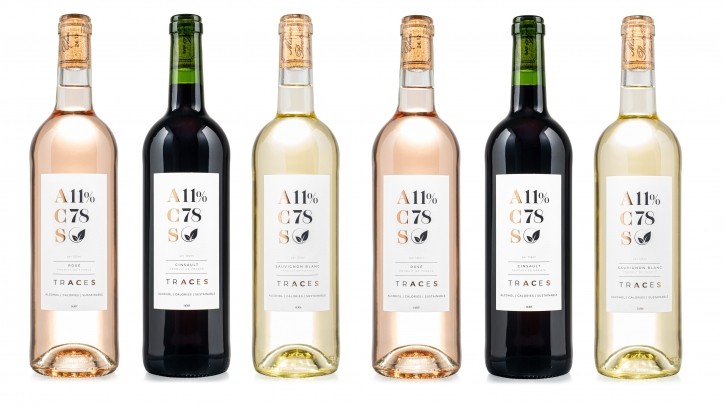The wine officially endorsed by WW

The wine is around 30% lower in calories than standard versions, with a glass equating to 3 points for WW (previously known as WeightWatchers) members.
While the wines will be a welcome addition for WW members, TRACES' founder and MD Tom Bell says the brand can open up opportunities for wine in a market where overall consumption is declining, with where consumers are drawn to the ‘better for you’ movement.
Making lower calorie wines
The wines are made in the south of France, in the Languedoc Roussillon winemaking area between Montpellier and Beziers, some 30 minutes from the Mediterranean sea.
The plots were selected because they are known for ‘precose’ or ‘early ripening’. Grapes are harvested 2-3 weeks earlier than normal (in mid-August), before sugar levels get too high. They are then closely monitored through a longer aging process to ensure sugar is consumed by alcoholic fermentation, leaving zero residual sugar.
The range includes three varieties: Grenache Rosé, Sauvignon Blanc and Red Cinsault, and each contain 78kcals per 125ml serving. However, the wines still retain a relatively normal 11% ABV.
That results in a wine that is, on average, 30% lower in calories than the average wine on UK alcohol info site drinkaware.
But - perhaps surprisingly for an organization best-known for counting points - being endorsed by WW wasn't about being the lowest calorie wine out there, explains Tom Bell, founder and managing director of TRACES and DrinkWell, the retail platform behind the brand.
“The vital point in TRACES is that although there may be lighter wines out there with overall less calories, TRACES is the only naturally made wine that doesn’t compromise on its quality and craftsmanship,” he said.
“Unlike all others who mechanically dealcoholize and add flavorings, sugars and chemicals to make it drinkable. This doesn’t align to the foundations of the WW program and a compromised product doesn’t fit its blueprint.”
What do lower calorie wines taste like?
Do lower calorie wines taste as good as their counterparts? Yes, says Bell, pointing out TRACES has won multiple awards – including those in the ‘normal’ wine category.
“Both IWSC & IWC blind tasting panels have given the wines awards for the last two vintages consecutively. TRACES is the only wine of its type to achieve this,” he said.
“Our customers often say drinking TRACES surprises them, due to not realizing a lighter calorie wine could taste that good. With over 150,000 bottles sold, we have perfectly refined the style and the quality from launch. It’s an excellent example of innovation meeting experience and regional style – offering a refreshing, lighter experience for those who want to enjoy wine, but also look after their wellbeing.”
Wait – isn’t low alcohol all the rage?
The low and no alcohol category is booming. While lower alcohol wines might not have seen the same success as lower alcohol beers, plenty of brands are innovating in this space and believe the category has a clear future.
But why do people want lower alcohol products? Bell believes that, for many consumers, it’s not always about reducing alcohol - and often more about reducing calories. That's why TRACE still comes in at 11% ABV.
“From our own customer insight and 12-years’ experience in this space, it’s clear that the appetite from consumers to drink alcohol, across wine and beer, but still reduce their calories, is increasingly becoming more important than simply just reducing alcohol,” he said.
“Our research and marketplace data shows that 79% of consumers want to reduce their calorie intake without reducing the quality of the alcohol they consume.”
While alcohol-free wines may tick the box of being alcohol-free, they often fail in other aspects and that’s one reason why the category hasn’t seen the success one might hope, says Bell.
“DrinkWell has been pioneering this category for a while, and over the years, we’ve seen the reaction to the quality of other low-alcohol wines to be extremely poor – customers never tend to buy them twice!
“In our view, the current science and nature of wine doesn’t allow for clean quality, when wines go below 10% ABV. Mid and low strength wines mechanically manipulate the wines and therefore must add lots of ‘stuff’ i.e. chemicals, sugars etc to make it taste anything like a normal wine.”
Making low calorie premium
What’s immediately noticeable about TRACES is that it's low calorie positioning isn’t immediately noticeable. That’s a deliberate move, says Bell, because he doesn’t want the brand to be about compromising (in the same way, notions of compromise are what’s plagued the lower alcohol category for years).
“From our experience, any brand that has been overtly badged as ‘low cal’, or similar, has struggled,” he said.
“For us, drinking TRACES is all about the experience and in our opinion, a bottle branded with messaging around “low cal” doesn’t add to the experience. We don’t want our customers to feel as if they are having to compromise or cut back (as this certainly isn’t the case!).
“TRACES is a premium, lifestyle brand, that fits effortlessly into the lives of our customers. We help support them make informed decisions, without asking them to compromise on the sophistication and glamour that often comes with drinking quality wines.
The brand’s name - TRACES – includes the 'ACS' which stand for ‘Alcohol’ ‘Calories’ ‘Sustainability’.
“There are TRACE elements of sugars, carbs and chemicals in the wine and the sustainability credentials mean it leaves little TRACE on the earth,” explains Bell. “Our messaging is subtle, but still forms the core of our products.
“TRACES is the next generation of wine as we strive to ‘make wine great again’ and bring the younger and modern drinker back to the wine glass. That’s the future the wine industry needs right now, and we are working hard to provide a solution, that we know millions around the world are desperate to have," he concluded.





